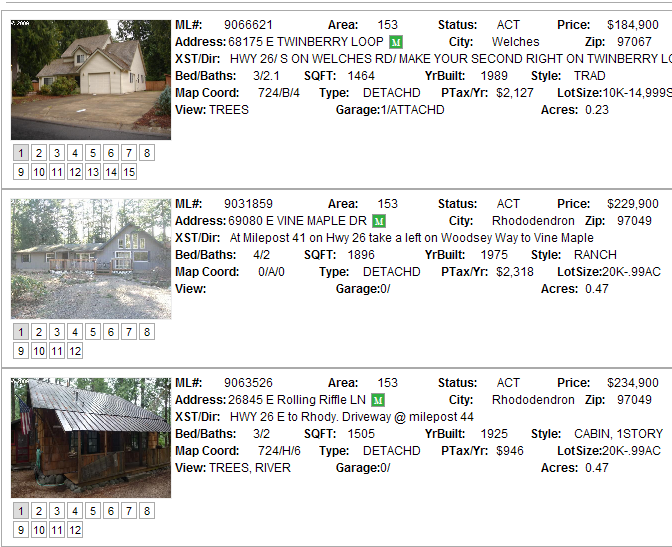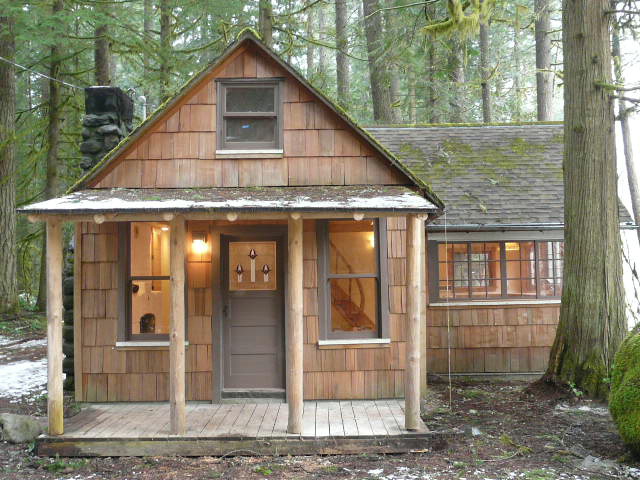Mt. Hood Foreclosures
They're still coming and here is the current list of foreclosued homes in the Mt. Hood Area from Brightwood, Welches, Government Camp and Rhododendron:

Displaying blog entries 1671-1680 of 1988
They're still coming and here is the current list of foreclosued homes in the Mt. Hood Area from Brightwood, Welches, Government Camp and Rhododendron:


STUCK IN PORT?
Imagine the Pearl Harbor attack of 1941 going unanswered . . . Many of our ships found at anchor by attacking planes went down, never to leave the harbor again. Imagine the economy floundering with interest rates at 12%, and learning that the head of "the fed" has taken a six-month, non-working vacation to Tahiti. Imagine how you would have felt on September 12, 2001 if our president had appeared on TV to tell us how sorry he was about the attacks without announcing action to protect us in the future.
We expect our nation's leaders to act in times of crisis, don't we? But - what do we expect of ourselves when a family crisis arises, our sales flounder, or we notice the numbers on our scale beginning to creep upward to uncomfortable levels? Do we set sail, or lie at anchor hoping "someone" will do "something?"
Babe Ruth sailed against the wind more often than with it. He is remembered for his home runs - 714 of them - yet he struck out 1,330 times in his career. Best of all, he set sail and got out of the harbor (took his bat to the plate) 8,399 times. Had he stayed safely in the dugout, he could have avoided all those strikeouts.
So - what about you? Having difficulty setting sail lately? Perhaps it's time to give your engine a little maintenance, or take out a needle and thread to repair torn sails. You may also want to pull out your map to redefine the direction you'll be taking in coming months.
If you've been spending too much time at the "Captain's Table" and not enough time on the bridge with the wheel in your hand, perhaps some planning now will send you full speed ahead out of the harbor and with some exotic port of call in sight. Bon Voyage!
Ok, now is the time to make your move to purchase on Mt. Hood. In the past week we have seen 22price reductions alone on Mt. Hood inventory from Government Camp, Welches, Brightwood and Rhododendron! Sellers are getting even more motivated to get their property sold, sooner, than later! The rush is on for first time home buyers to use that $8,000 tax credit which is about to expire.
Interest rates are the lowest we've seen in the past three months. So, is this the time to jump in and take advantage of the incredible inventory, low interest rates, and super home buyer credits from the Feds? You bet it is!
Do you love the sound and sights of the river? This is a great setting right on the Zig Zag River! The cabin boasts high vaulted ceilings with beams, a fireplace with a super wood stove insert, French doors off the living room area and dining room, a killer view of the Zig Zag River, new composite decking and MORE. The sleeping area has two bedrooms and a kids loft which is accessed with a ladder.
Offered at $218,900 with possible contract terms!
The kitchen and dining room areas are spacious and the view from the dining room table is stunning. A nice oil heater warms the entire cabin!
Since this cabin is at a slightly lower elevation your winter access might be better for skiing! Tons of hiking in a pristine setting makes this a super location.
This cabin is located in the Mt. Hood National Forest on leased land. It's a short drive to premium ski areas and about 5 minutes to a 27 hole golf course.
Only about one hour from Portland!
The credit for $8,000 to first time home buyers that qualify is about to expire on November 30 of this year!
Housing lobbyists are busy working on a campaign to get this credit extended for at least another year. Some groups, like home builders, are pushing for the credit to be extended to anyone buying a home, not just first time home buyers. The chairman of the Senate banking committee, Chris Dodd, is pushing for an extension and an expansion to up to $15,000 max for a credit for an additonal year.
Don't count on anything passing but there are certainly groups trying to make this happen. The $8,000 credit has certainly helped the starter home sales but move up buyers have been slow to join the market recovery.
Details to come!
ATTENTION HUCKLEBERRY LOVERS ON Mt. Hood
EVENT ON AUGUST 28-30th!
One of our areas popular events in August is the Mt. Hood Huckleberry Festival and Barlow Trail Days hosted by the Cascade Geographic Society. Here are details:

Details of the weekend event schedule start here.
If there ever was a "10" location, this is it. Set on the banks of the Salmon River with stunning views from nearly every window! This Shadow Hawk Condo has been completely remodeled from top to bottom.

Here's one of the views from the unit.

Living Room with fireplace and wood floors.

Take a tour here Offered at $275,000 and it comes mostly furnished! Enjoy the amenities of a full time manager, swimming pool and hot tub plus party room.
Located in the heart of Welches right across from the golf course at the Resort at the Mountain, undergoing a 16 million dollar renovation! You can't beat this location!
Great ski cabin with tons of room and TWO BATHROOMS, just hit the market! There's a wonderful riverrock fireplace, high ceilings, a bedroom down and a double loft area upstairs with a bathroom on each level! This cabin has a super location with an easy access walk down to the Zig Zag River. With around 1100 square feet of living space you can pack them in and it's only about five minutes to Government Camp for premium skiing!


Take a tour of this great cabin offered for $210,000. Seller will even consider contract terms on this Mt. Hood National Forest property.
ZigZag Riverfront Cabin has price slashed by $20,000!
Over seas owner says must sell now! Price is firm at $130,000! Will consider a contract with $30,000 down with a well qualified buyer!

leased land in the Mt. Hood National Forest
Displaying blog entries 1671-1680 of 1988

